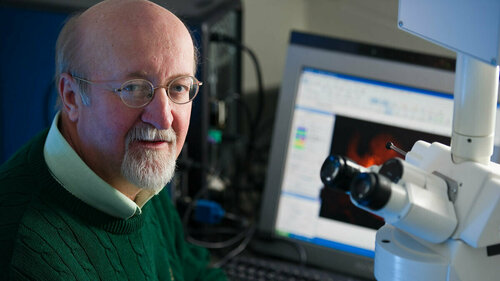
Robert A. Schulz, Notre Dame Professor of Biological Sciences at the University of Notre Dame, died Saturday (July 6). He was 64.
Schulz joined the Notre Dame faculty in 2007, and before that rose through academic ranks at the University of Texas MD Anderson Cancer Center from 1985 to 2007.
His research focused on blood formation and immunity in the fruit fly, Drosophila melanogaster. Because fruit flies and humans share 60 percent of their genes, Schulz’s work provided a better understanding of how the processes of blood formation and immunity occur in people. His work led to advancements in the understanding of congenital heart defects, leukemias and cancer stem cells. He was affiliated with the Harper Cancer Research Institute and the Center for Stem Cells and Regenerative Medicine.
“He used state-of-the art genetic approaches to answer fundamental questions about how the immune system develops in the fruit fly,” said David Hyde, biological sciences professor and the Kenna Director of the Zebrafish Research Center at Notre Dame. “He was still actively pursuing his research, for which he was well respected in the Drosophila community worldwide.”
Schulz, who earned his bachelor’s degree in chemistry from the University of North Carolina in 1976 and his doctoral degree in biochemistry from Georgetown University, created a developmental biology course for undergraduates at Notre Dame.
“Notre Dame was lucky to recruit Dr. Schulz from the prestigious MD Anderson Cancer Research Center, where he established a strong research program,” said Kevin Vaughan, associate professor of biological sciences. “Dr. Schulz quickly positioned himself as a leader in biological sciences at Notre Dame, and he improved the visibility of Notre Dame research at the national level through his outreach.”
In 2016 Schulz received a two-year grant from the National Institutes of Health to study the Drosophila immune system’s response to stress. Schulz was known for voicing strong support for ongoing graduate student research projects during annual research seminars, Vaughan noted.
“He always held his graduate students to a pretty high level of expectation,” Hyde said. “He wanted them to be able to generate data that would lead to meaningful research publications that would have a significant impact.”
Schulz enjoyed traveling, especially to Rome, with his wife, Cathy.
“They always enjoyed going every year and wanted to see the Pope,” Hyde said. “At one point when they made that trip, he was within a couple of feet of the Pope during a procession at the Vatican — and that was very memorable to him, that he was that close.”
A visitation will be held from 4 to 8 p.m. Friday (July 12) in the Kaniewski Funeral Home, 3545 N. Bendix Drive, South Bend. A funeral Mass will be celebrated at 11 a.m. Saturday (July 13) in Christ the King Catholic Church, 52473 Indiana 933, South Bend. Burial will follow in Cedar Grove Cemetery.
“Bob Schulz’s passing is a reminder of the fleetingness of life,” said Crislyn D’Souza-Schorey, Morris Pollard Professor and chair of the Department of Biological Sciences. “My colleagues and I are grateful for the time we shared with him. We hold Cathy, their children and other family members in our prayers.”